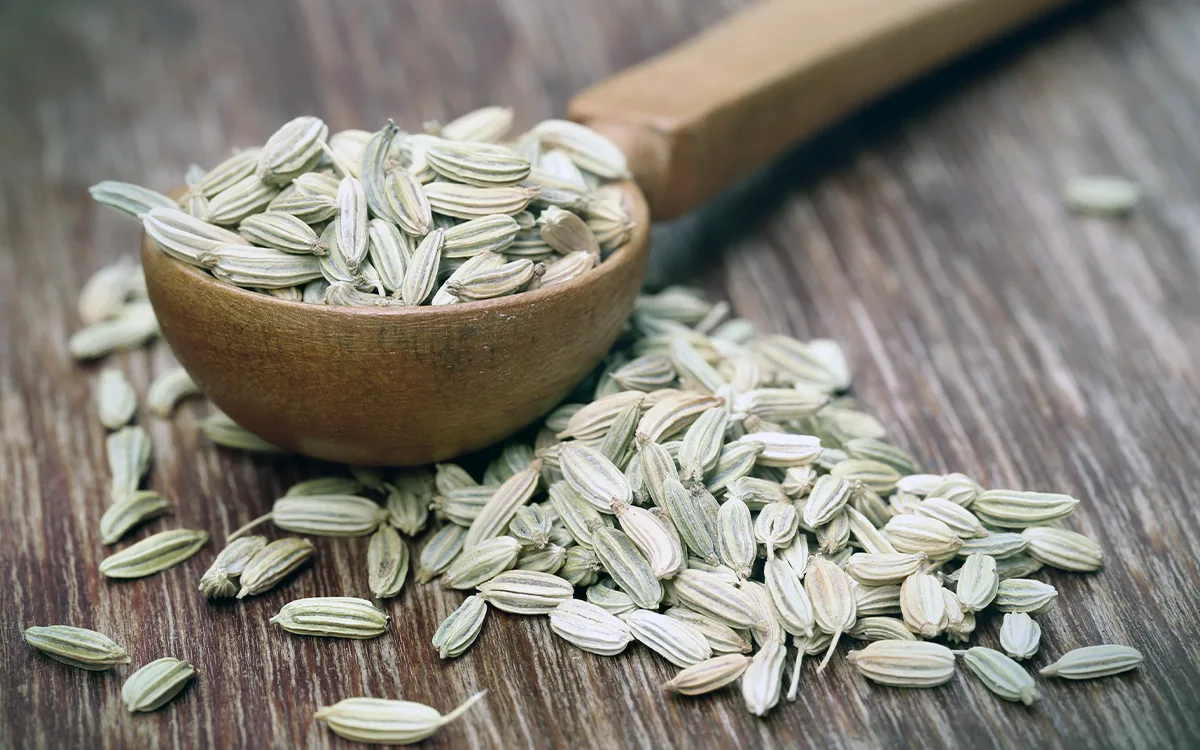Feeling gassy or bloated after a meal is something many people experience. Whether it is from eating too fast, having heavy meals, or dealing with daily stress, gas and bloating can be uncomfortable. One traditional remedy that continues to be used around the world is fennel seeds.
Known for their sweet licorice flavor and aroma, fennel seeds have been used in kitchens and traditional wellness practices for centuries. This tiny seed does more than just freshen your breath after a meal—it is also known for its role in helping the body handle digestive discomforts like gas.
This blog explores the benefits of fennel seeds for gas, plus how to use them effectively in daily life.
What are fennel seeds?
Fennel seeds come from the fennel plant, a tall herb in the carrot family. The seeds are small, oval, and greenish in color, with a sweet, slightly spicy taste similar to licorice.
They are widely used in Indian, Middle Eastern, and Mediterranean cooking, both for flavor and for their traditional digestive benefits. Many cultures also chew fennel seeds after meals.
How do fennel seeds help with gas?
One of the most common traditional uses of fennel is for helping with gas and bloating. The natural oils found in fennel seeds, such as anethole, may help the digestive tract relax. This can support smoother movement of food and gas through the intestines, easing that full, tight feeling after eating.
Some studies and traditional texts suggest that fennel can help manage the production of gas during digestion and help ease the pressure that comes with it. While more research is always helpful, fennel remains a popular choice for digestive support thanks to its long-time use and natural approach.
How to use fennel seeds for gas?
There are many simple ways to enjoy fennel seeds and experience their potential benefits for digestion:
- Chew a teaspoon of fennel seeds
This is one of the most traditional methods. After a meal, simply chew about 1 teaspoon of fennel seeds. The act of chewing helps release the oils, and swallowing the seeds gives the digestive tract access to them.
- Drink fennel seed tea
Fennel seed tea is another common way to enjoy these seeds. To make it:
- Crush 1 to 1.5 teaspoons of fennel seeds slightly.
- Add them to a cup of hot water.
- Let it steep for 5 to 10 minutes, then strain and drink.
Drinking this tea warm can help the stomach feel calm and less bloated. It can be taken after meals or whenever you feel gassy.
- Soak fennel seeds overnight
Soaking fennel seeds in water overnight and drinking the water the next morning is also a gentle way to include it in your routine. This can help with regular digestion and may support the body’s ability to handle gassy meals better.
What are other benefits of fennel seeds?
In addition to helping with gas, the benefits of fennel go beyond digestion. Here are a few other wellness areas fennel seeds are traditionally known to support:
- Help ease bloating: Many people use fennel when they feel full, tight, or bloated after a meal.
- Support healthy digestion: Fennel may help with regular bowel movements and stomach comfort.
- Natural mouth freshener: Thanks to its sweet licorice taste and smell, fennel seeds are great for freshening breath.
- Mild calming effect: The gentle aroma of fennel may help relax the mind, especially when sipped as warm tea.
While these benefits are often based on traditional use, fennel seeds are still a common favorite in many wellness routines.
Is it safe to use fennel seeds every day?
Fennel seeds are generally safe when taken in small amounts as part of food or tea. Many people include them in their daily diet without any issues.
However, like anything, it is important not to overuse. Start with a teaspoon of fennel seeds or one cup of fennel seed tea a day. If you are pregnant, nursing, or have any health concerns, you may want to talk with your healthcare provider before using them regularly.
Also, it is worth noting that effects of fennel may vary from person to person. Some might feel better digestion quickly, while others may notice changes over time.
How to pick and store fennel seeds?
When buying fennel seeds, look for ones that are green in color and smell fresh. Avoid seeds that look pale or have no smell—they may be old or stale.
Store fennel seeds in a cool, dry place in an airtight container. This will help keep their natural oils and flavor intact for a longer time.
If you are using fennel seeds in hot water for tea or soaking, always crush or slightly break them before use. This helps release the oils and makes the tea more effective.
Conclusion
So, do fennel seeds help with gas? Based on traditional use and growing interest, the answer is yes, they can help ease that discomfort naturally.
From chewing them after meals to sipping on warm fennel tea, there are several easy ways to include them in your routine. With their sweet licorice flavor and gentle effect on digestion, fennel seeds offer a simple, natural approach for handling occasional gas and bloating.
Whether you are looking to support regular digestion or just want a little help after a heavy meal, adding a teaspoon of fennel seeds might just do the trick.
As always, listen to your body and enjoy nature’s simple solutions in balance.
Checkout This Blog: Can Enzyme Supplements Be the Key to Easier Digestion?

